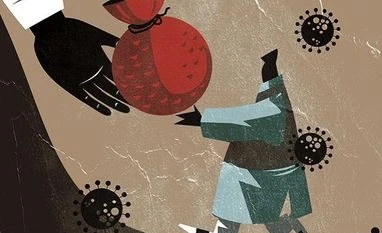The finance ministry has ruled out voting on the borrowing options given by the Centre to the states in lieu of their GST compensation dues at the next GST Council meeting on Monday.
Sources in the government said that as per constitutional provisions the GST Council does not have the jurisdiction to approve the borrowing plan of states and it has to be decided only between the states and the expenditure department.
"The constitutional provisions with regard to borrowings to be undertaken by states is clear. If some states want a vote on the issue at GST Council meeting they seem to be mistaken about the mandate of the Council. Even if voting is done there, it would be meaningless," said the source.
With the Covid-19 pandemic sharply reducing the revenue realisation of both the Centre and the states, the GST compensation needs of states have enlarged substantially beyond what is expected to be collected through compensation cess. This gap, however, needs to be filled and in this regard the Centre offered the states two borrowing options to meet the shortfall in compensation cess collection this year.
The GST Council is yet to receive the unanimous support of the states for this proposal with about 10 opposition ruled states and union territories wanting the options to be dropped and the Centre undertaking all borrowings to pay for the GST compensation shortfall to states.
"Majority support of 21 states is for the first option suggested by the Centre. So, even in voting, this option will win. But without the Council's mandate, voting will not take place," said the source quoted earlier.
More From This Section
The expenditure department in the finance ministry is already working and discussing with the states individually to get the borrowing programme going so that the compensation issue is settled.
Sources said that even if all the states do not agree to the borrowing options for settling GST compensation, the plan may be rolled so that the states do not suffer with regard to their enhanced expenditure needs this year in the wake of the pandemic.
Other states, who do not opt to borrow, may be paid compensation from the cess collected this year. The entire compensation will be settled after June 2022, during the extended period of cess levy beyond the five year transitional GST rollout period.
Already, the Centre has distributed the entire Rs 20,000 crore collected from GST compensation cess this year so far to the states. There is expectation that cess collection this year may be around Rs 65,000 crore.
The two borrowing options given by the Centre to the states at the previous GST meeting in August included one calculating GST related shortfall in revenue at Rs 1,10,000 crore that will be borrowed by states under special dispensation from the Reserve Bank of India (RBI). This borrowing will not be counted from any of the states' existing borrowings and its entire interest and principal would be settled through compensation cess including the levy in the extended period.
The second option gives the states' plan to borrow the entire expected shortfall of Rs 2,35,000 crore this year and this borrowing will only be paid back to states during the extended period of GST compensation cess levy.
)